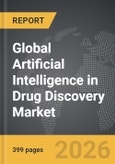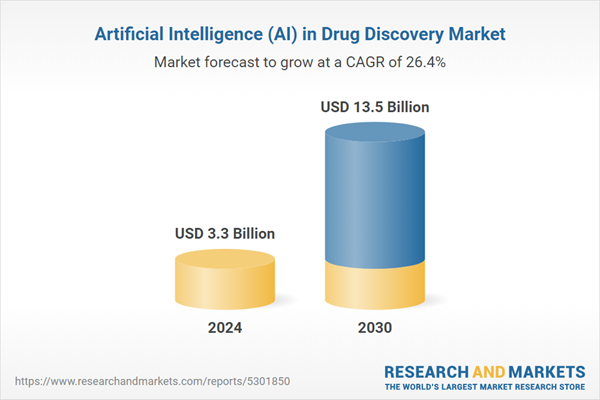Global Artificial Intelligence (AI) in Drug Discovery Market - Key Trends and Drivers Summarized
How Is AI Revolutionizing the Drug Discovery Process?
Artificial intelligence is transforming the drug discovery process, bringing unprecedented speed, precision, and innovation to an area historically known for lengthy timelines and high costs. In traditional drug discovery, identifying potential compounds, testing them, and moving them through clinical trials can take over a decade and cost billions of dollars. AI is significantly shortening this process by using machine learning algorithms to analyze vast chemical datasets, identify promising drug candidates, and predict how these compounds will interact with specific biological targets. AI systems can screen millions of compounds in a fraction of the time it would take human researchers, narrowing down potential candidates with a high likelihood of success. For instance, deep learning models analyze molecular structures to predict properties such as toxicity, stability, and efficacy, streamlining the preclinical phase and reducing the risk of failure in later stages. By accelerating compound screening and enhancing predictive accuracy, AI is transforming early-stage drug discovery into a faster, more data-driven process, bringing new treatments to market sooner and expanding the scope of possible medical breakthroughs.What Role Does AI Play in Personalized Medicine and Precision Therapeutics?
AI is opening new avenues for personalized medicine by enabling more accurate and tailored approaches to treatment development, considering individual genetic, environmental, and lifestyle factors. Through data from genomic sequencing and patient health records, AI algorithms can identify biomarkers and genetic variations that influence how individuals respond to specific treatments. This capability allows researchers to develop drugs that target particular patient populations, optimizing efficacy and minimizing side effects. AI-driven predictive models also enable more precise dose optimization, adjusting for factors like age, weight, and metabolic rate, which is especially critical in treating diseases such as cancer, where patient responses to treatment can vary significantly. Additionally, AI in drug discovery supports the identification of novel drug targets linked to rare genetic conditions or complex diseases, such as Alzheimer's, that may not have been evident using traditional methods. By transforming vast amounts of biological data into actionable insights, AI is paving the way for precision therapeutics, where treatments can be tailored to the specific needs of individual patients, thus enhancing outcomes and reducing trial-and-error in treatment approaches.How Does AI Enhance Efficiency in Clinical Trials?
AI is optimizing clinical trials by streamlining participant selection, improving monitoring, and predicting trial outcomes, thus addressing some of the biggest hurdles in the drug discovery process. Patient recruitment, a time-consuming and costly aspect of clinical trials, is being transformed through AI algorithms that analyze electronic health records to identify eligible participants based on genetic markers, demographics, and medical history, ensuring more precise matches for trial criteria. This approach reduces recruitment time and improves the likelihood of enrolling participants who are more likely to respond favorably to the drug being tested. During the trial, AI-powered data analytics and wearable devices provide real-time monitoring, tracking vital signs, adherence, and adverse effects, offering comprehensive insights into patient responses. Predictive analytics further enhance trial efficiency by forecasting potential trial outcomes based on historical data, guiding decisions about trial continuation or modification to optimize resource allocation. AI's role in trial simulation models is also proving valuable, as it helps researchers predict the success rate and adjust protocols, ultimately reducing the time and costs associated with clinical trials. Through these innovations, AI is improving the reliability and speed of clinical trials, facilitating a more agile and responsive drug discovery process.What Factors Are Driving the Growth of AI in the Drug Discovery Market?
The growth in the AI in drug discovery market is driven by several factors, including technological advancements, the increasing need for cost-effective and efficient drug development, and the rise of complex diseases requiring innovative treatment approaches. One significant driver is the advancement of computational power and cloud-based platforms, which allow for the analysis of large datasets, complex molecule structures, and high-throughput screening, making AI more accessible and scalable for pharmaceutical companies. Additionally, the soaring costs and long timelines associated with traditional drug discovery are prompting the industry to adopt AI-driven approaches that reduce both time and expenditure, as AI offers tools to identify promising compounds and predict outcomes with higher efficiency. The rise of personalized medicine and targeted therapies has created demand for AI solutions capable of analyzing genetic and biomarker data to tailor treatments to specific patient profiles. Moreover, the increasing prevalence of complex diseases like cancer and neurodegenerative disorders has accelerated the need for novel drug discovery methods, as traditional approaches have struggled to address these challenges adequately. Finally, regulatory support for AI applications in drug discovery has also contributed to market growth, as governments and health organizations are beginning to acknowledge and facilitate the role of AI in addressing urgent medical needs. Together, these technological, economic, and healthcare demands are driving the integration of AI into drug discovery, setting the stage for a future where AI significantly enhances the pace and precision of bringing new medicines to market.Report Scope
The report analyzes the Artificial Intelligence (AI) in Drug Discovery market, presented in terms of market value (US$ Thousand). The analysis covers the key segments and geographic regions outlined below.- Segments: Therapeutic Area (Oncology, Neurodegenerative Diseases, Metabolic Diseases, Cardiovascular Disease, Infectious Disease, Other Therapeutic Areas); Application (Drug Optimization & Repurposing, Preclinical Testing, Other Applications).
- Geographic Regions/Countries:World; United States; Canada; Japan; China; Europe (France; Germany; Italy; United Kingdom; and Rest of Europe); Asia-Pacific; Rest of World.
Regional Analysis
Gain insights into the U.S. market, valued at $971.9 Million in 2024, and China, forecasted to grow at an impressive 25.6% CAGR to reach $2.1 Billion by 2030. Discover growth trends in other key regions, including Japan, Canada, Germany, and the Asia-Pacific.Why You Should Buy This Report:
- Detailed Market Analysis: Access a thorough analysis of the Global Artificial Intelligence (AI) in Drug Discovery Market, covering all major geographic regions and market segments.
- Competitive Insights: Get an overview of the competitive landscape, including the market presence of major players across different geographies.
- Future Trends and Drivers: Understand the key trends and drivers shaping the future of the Global Artificial Intelligence (AI) in Drug Discovery Market.
- Actionable Insights: Benefit from actionable insights that can help you identify new revenue opportunities and make strategic business decisions.
Key Questions Answered:
- How is the Global Artificial Intelligence (AI) in Drug Discovery Market expected to evolve by 2030?
- What are the main drivers and restraints affecting the market?
- Which market segments will grow the most over the forecast period?
- How will market shares for different regions and segments change by 2030?
- Who are the leading players in the market, and what are their prospects?
Report Features:
- Comprehensive Market Data: Independent analysis of annual sales and market forecasts in US$ Million from 2024 to 2030.
- In-Depth Regional Analysis: Detailed insights into key markets, including the U.S., China, Japan, Canada, Europe, Asia-Pacific, Latin America, Middle East, and Africa.
- Company Profiles: Coverage of players such as Atomwise, Inc., Benevolentai, Berg LLC, Bioage, Cloud Pharmaceuticals, Inc. and more.
- Complimentary Updates: Receive free report updates for one year to keep you informed of the latest market developments.
Some of the 293 companies featured in this Artificial Intelligence (AI) in Drug Discovery market report include:
- Atomwise, Inc.
- Benevolentai
- Berg LLC
- Bioage
- Cloud Pharmaceuticals, Inc.
- Cyclica
- Deep Genomics
- Envisagenics
- Exscientia
- Google (A Subsidiary of Alphabet Inc.)
- IBM Corporation
- Insilico Medicine
- Microsoft Corporation
- Numedii, Inc.
- Numerate
- NVIDIA Corporation
- Owkin, Inc.
- Twoxar, Incorporated
- Verge Genomics
- Xtalpi, Inc.
This edition integrates the latest global trade and economic shifts into comprehensive market analysis. Key updates include:
- Tariff and Trade Impact: Insights into global tariff negotiations across 180+ countries, with analysis of supply chain turbulence, sourcing disruptions, and geographic realignment. Special focus on 2025 as a pivotal year for trade tensions, including updated perspectives on the Trump-era tariffs.
- Adjusted Forecasts and Analytics: Revised global and regional market forecasts through 2030, incorporating tariff effects, economic uncertainty, and structural changes in globalization. Includes historical analysis from 2015 to 2023.
- Strategic Market Dynamics: Evaluation of revised market prospects, regional outlooks, and key economic indicators such as population and urbanization trends.
- Innovation & Technology Trends: Latest developments in product and process innovation, emerging technologies, and key industry drivers shaping the competitive landscape.
- Competitive Intelligence: Updated global market share estimates for 2025, competitive positioning of major players (Strong/Active/Niche/Trivial), and refined focus on leading global brands and core players.
- Expert Insight & Commentary: Strategic analysis from economists, trade experts, and domain specialists to contextualize market shifts and identify emerging opportunities.
Table of Contents
Companies Mentioned (Partial List)
A selection of companies mentioned in this report includes, but is not limited to:
- Atomwise, Inc.
- Benevolentai
- Berg LLC
- Bioage
- Cloud Pharmaceuticals, Inc.
- Cyclica
- Deep Genomics
- Envisagenics
- Exscientia
- Google (A Subsidiary of Alphabet Inc.)
- IBM Corporation
- Insilico Medicine
- Microsoft Corporation
- Numedii, Inc.
- Numerate
- NVIDIA Corporation
- Owkin, Inc.
- Twoxar, Incorporated
- Verge Genomics
- Xtalpi, Inc.
Table Information
| Report Attribute | Details |
|---|---|
| No. of Pages | 399 |
| Published | January 2026 |
| Forecast Period | 2024 - 2030 |
| Estimated Market Value ( USD | $ 3.3 Billion |
| Forecasted Market Value ( USD | $ 13.5 Billion |
| Compound Annual Growth Rate | 26.4% |
| Regions Covered | Global |









